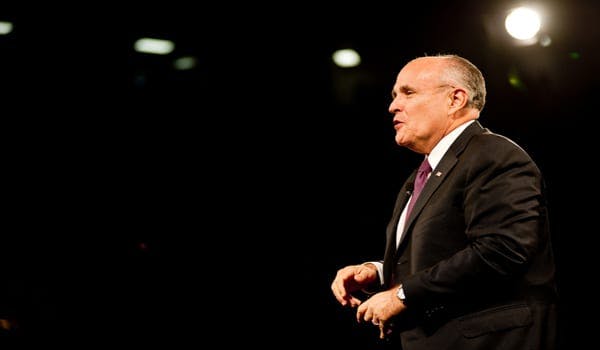As mayor of New York City for eight years, Rudy Giuliani was cast into the global spotlight following the September 11 terrorist attacks in 2001.
Nearing the end of his term, Giuliani took on a visible role in the aftermath, and became the face of leadership during a period of immense crisis.
In Australia as the keynote speaker for In The Room, a two-day conference showcasing leading thinkers in leadership, innovation, and risk, there is a palpable excitement when Guiliani takes to the stage.
He tells delegates at the Sydney Convention Centre that his mayoral term taught him valuable lessons in leadership.
“I’m often asked if I think leaders are born. In my opinion, they are absolutely made. First and foremost in leadership: if you want to be a leader, you have to have strong ideas. You have to have convictions, principles, and goals. If you don’t have goals that you want yourself and your people to achieve, they simply don’t know how to follow you,” Giuliani says.
He likens the importance of leadership to that of captaining a ship. “There’s no other better example of a quintessential leader than the captain of a ship. If the captain of a ship cannot decide on the destination, well then the people who work on that ship, the sailors, can’t participate in the journey. If the captain on ship sets sail, and doesn’t say where we’re going, then nobody on the ship has any idea on how to contribute to getting to the destination,” Giuliani says.
The same is true of leading in business – regardless of how many people are in a team, without setting out what is to be achieved, and the plan for how to reach it, the destination or goals, simply cannot be reached.
In deciding on the business objectives however, fear of failure mustn’t be a factor. “Never be afraid of failure – failure is how you learn to succeed. Every great man or woman, who has achieved greatness in life, has also failed. And you learn a lot more from your mistakes than you do from your success – because when you succeed, you think you did everything right. When you fail, you think you did everything wrong. Failure is part of the growing process, so never be afraid of it, use it, and utilise it in a positive way,” Giuliani says.
Making comparisons with politics, Giuliani said it’s integral to ensure the big ideas predominate. When they don’t, the small, the trivial and the silly take over.
Chief ingredients in leadership he says are also optimism, teamwork, calculated risk-taking, and sheer relentless preparation. This is a point he emphasises, and one he says has helped him throughout his career; but it helped him the most on September 11.
“Of course, despite relentless preparation, something unanticipated can always happen, something can always go wrong. Things can always go wrong. But when something unexpected does happen, through the relentless preparation you’ve already done, the answers will just come to you, because it will probably just be a variation of something you’ve already thought of if you really prepared properly,” Giuliani says. “That ethos helped me many, many times in life, in business, in government – and the time it helped me the most, was on September 11, when the World Trade Centers were attacked.”
Closely connected to relentless preparation, Giuliani says, is teamwork.
“In order to accomplish anything, you need good people to help you. You cannot accomplish it on your own. Look yourself in the mirror and ask yourself, what are my weaknesses? Then go find somebody who can compensate for that,” he says.
“When I became mayor of New York, there were two problems that needed fixing right away – tremendous crime, and a very weak economy – even weaker than today. I had to fix both quickly. I’d been involved in law enforcement all my life, I’d been involved in every level, and I knew exactly how I wanted to proceed, and very little about what happened in crime reduction surprised me.”
“But as much as I knew about crime, that’s as little as I knew about the economy. I wasn’t an economist, and I knew whatever citizens knew about taxes and so on. I needed to get really good people, [and] whether it’s a small team, or a team of a hundred people, it’s important to balance strengths and weaknesses,” Giuliani says.
The final principle of leadership according to the former mayor is that communication is absolutely paramount.
“If you really want to lead, you’ve got to love and care about people. If you don’t care about people, go and do something else. You’ve got to display care for your people if you want them to perform above and beyond the call of duty. That’s the ultimate in communication,” Giuliani says.

